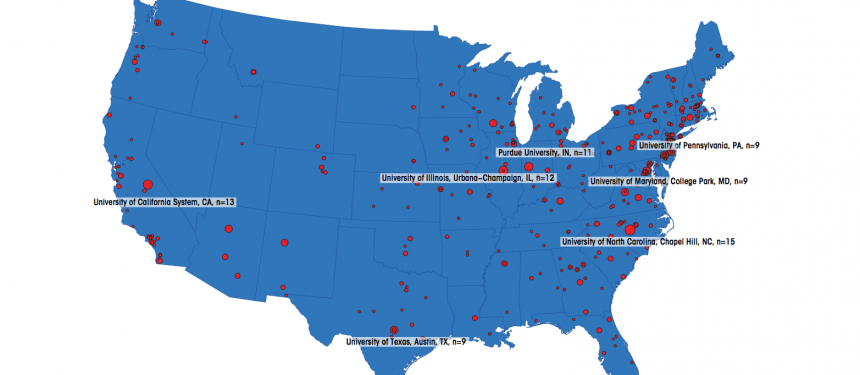Similarities between the US and the UK’s higher eduction environments create fertile ground for institutional collaboration, which many universities to take their first forays into cross-border partnerships before venturing into other markets, it has emerged from a report from the American Council of Education.
News and business analysis for Professionals in International Education
Have some pie!
Fertile ground for US-UK HE partnerships, potential for deeper ties
 Universities in the US with exchange programs in the UK. Photo: ACE
Universities in the US with exchange programs in the UK. Photo: ACE The report, in collaboration with Sannam S4, which helps universities and colleges implement their international strategies in over 20 countries, also outlines that the political situation in both countries has led to renewed attention on these US-UK partnerships.
The two countries share “overall quality, access to funding, strength of the research enterprise, and general trajectory of internationalisation” in higher education, according to US-UK Higher Education Partnerships: Firm Foundations and Promising Pathways.
Because of these similarities, UK-US partnerships are sometimes used to test the waters for institutional partnerships further afield, explained Brad Farnsworth, vice president at ACE’s Center for Internationalization and Global Engagement.
“In terms of where our US institutions are looking at as the next frontier, the UK is not in there”
“US institutions… use their partnerships with the UK as more of a laboratory to experiment on more sophisticated modes of engagement because of the familiarity,” he told The PIE News.
Some institutions think international partnerships are “really risky and complicated and it could have huge payoffs, so let’s start doing this at a place where we are really, really familiar with the legal and political environment,” he said.
“And if it works, we can take it around the world.”
Adrian Mutton, chief executive of Sannam S4, commented: “The increasing commitment to enhancing UK-US institutional relationships as the report highlights echoes the levels of activity we are seeing with our own clients in both countries.”
“With the right focus and approach there is so much unrealised potential to be unlocked by British and American institutions either side of the Atlantic,” he said.
However, there is the danger that this familiarity will lead to complacency. Robin Helms, director of internationalisation and global engagement at the CIGE, said US-UK partnerships are sometimes placed on the backburner.
“One issue we brought up is there’s a lot of existing activity, but in terms of where our US institutions are looking at as the next frontier, the UK is not in there,” she told The PIE News.
Existing relationships need to be actively maintained, Helms said, but are sometimes taken for granted.
“There was one UK institution representative who said every time we do something in a new country, when we start a partnership in China, there’s a big press release and all of these things, and not so much when it’s US and UK,” she commented.
Another commonality that has emerged more recently between the two countries is political turbulence.
The Brexit vote and the election of Donald Trump have brought about a “parallel set of challenges for colleges and universities, particularly when it comes to internationalisation, and renewed attention to the UK-US higher education relationship,” the report states.
One common challenge is boosting the levels of participation in outbound study, despite both being among the top study abroad destinations for students of each country, the report notes.
Twelve per cent of US students who travelled abroad in 2015/16 (38,189) went to the UK, for academic credit and non-credit bearing programs, according to IIE’s Open Doors data.
The US was the third most popular destination for study abroad for UK students (3,615) in the same year, behind France and Spain.
In spite of these common elements, the report points out a number of differences between the two higher education systems, which create further challenges in partnerships, including the size of these institutions, degree structure, and compliance requirements.
Another challenge is calendar and course equivalencies. While in the US, a course unit typically equals the duration of a semester, in the UK, it often lasts as long as a year.
Cultural differences, as well as internationalisation and partnership goals, also inhibit some relationships.
As a result, the report recommends that institutions work to clearly articulate the value proposition.
“In everybody that we talked to there really is an enthusiasm for these relationships”
“In everybody that we talked to there really is an enthusiasm for these relationships,” Helmes assured. “I think they are really seen as strong and there is strong commitment to it. It’s just this really thinking through making the case and really articulating the value proposition.”
And, in light of the geopolitical changes, Helms noted that there is “tremendous potential” to navigate this shared reality “by sharing practices and thinking beyond institution level partnerships to how our system’s working together”.
“How are we sharing good practices?” she asked. “How are we contributing to the greater global good in ways that go beyond these institution partnerships?”
Still looking? Find by category:


